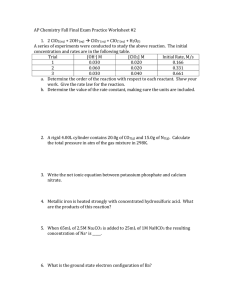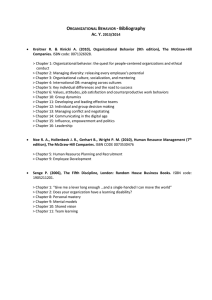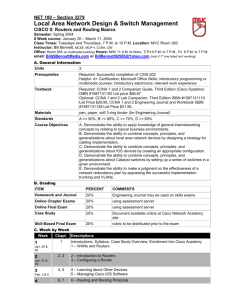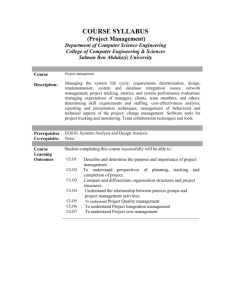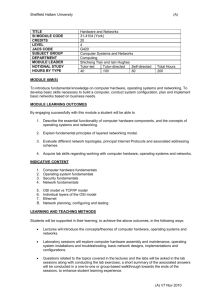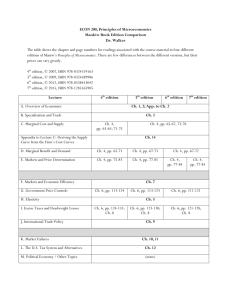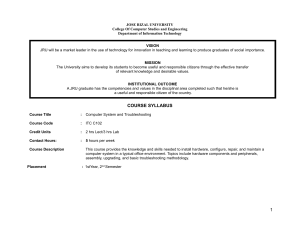course outline - WordPress.com
advertisement
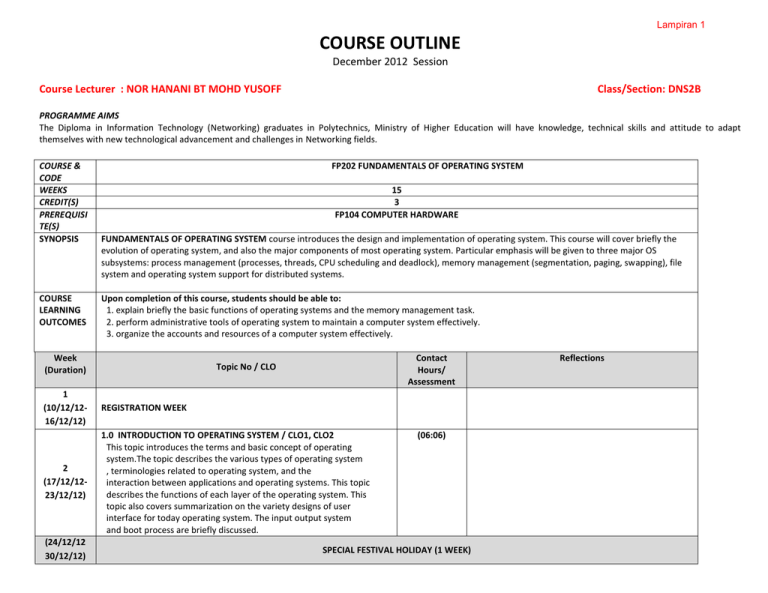
Lampiran 1 COURSE OUTLINE December 2012 Session Course Lecturer : NOR HANANI BT MOHD YUSOFF Class/Section: DNS2B PROGRAMME AIMS The Diploma in Information Technology (Networking) graduates in Polytechnics, Ministry of Higher Education will have knowledge, technical skills and attitude to adapt themselves with new technological advancement and challenges in Networking fields. COURSE & CODE WEEKS CREDIT(S) PREREQUISI TE(S) SYNOPSIS COURSE LEARNING OUTCOMES FP202 FUNDAMENTALS OF OPERATING SYSTEM 15 3 FP104 COMPUTER HARDWARE FUNDAMENTALS OF OPERATING SYSTEM course introduces the design and implementation of operating system. This course will cover briefly the evolution of operating system, and also the major components of most operating system. Particular emphasis will be given to three major OS subsystems: process management (processes, threads, CPU scheduling and deadlock), memory management (segmentation, paging, swapping), file system and operating system support for distributed systems. Upon completion of this course, students should be able to: 1. explain briefly the basic functions of operating systems and the memory management task. 2. perform administrative tools of operating system to maintain a computer system effectively. 3. organize the accounts and resources of a computer system effectively. Week (Duration) Contact Hours/ Assessment Topic No / CLO 1 (10/12/1216/12/12) REGISTRATION WEEK 2 (17/12/1223/12/12) 1.0 INTRODUCTION TO OPERATING SYSTEM / CLO1, CLO2 This topic introduces the terms and basic concept of operating system.The topic describes the various types of operating system , terminologies related to operating system, and the interaction between applications and operating systems. This topic describes the functions of each layer of the operating system. This topic also covers summarization on the variety designs of user interface for today operating system. The input output system and boot process are briefly discussed. (24/12/12 30/12/12) (06:06) SPECIAL FESTIVAL HOLIDAY (1 WEEK) Reflections 3 (31/12/12 – 6/1/13) 4 (7/1/13 – 13/1/13) 1.0 INTRODUCTION TO OPERATING SYSTEM / CLO1, CLO2 This topic introduces the terms and basic concept of operating system. The topic describes the various types of operating system, terminologies related to operating system, and the interaction between applications and operating systems. This topic describes the functions of each layer of the operating system. This topic also covers summarization on the variety designs of user interface for today operating system. The input output system and boot process are briefly discussed. 5 (14/1/13 – 20/1/13) 6 (21/1/13 – 27/1/13) 7 (28/1/13 – 3/2/13) 8 (4/2/13 – 10/2/13) (11/2/13 – 17/2/13) 2.0 MEMORY AND PROCESS MANAGEMENT / CLO1, CLO2 This topic covers the primary resources of an operating system, covering the organization of memory management physically and virtually. Discussions on process states, scheduling, interrupts, multi-threading, and deadlocks are also covered. 9 (18/2/13 – 24/2/13) 2.0 MEMORY AND PROCESS MANAGEMENT / CLO1, CLO2 This topic covers the primary resources of an operating system, covering the organization of memory management physically and virtually. Discussions on process states, scheduling, interrupts, multi-threading, and deadlocks are also covered. 10 (25/2/13 – 3/3/13) 11 (4/3/13 – 10/3/13) 12 (11/3/13 – 17/3/13) 3.0 FILE MANAGEMENT / CLO2, CLO3 This topic gives a description on how the operating system manages the file system. Discussions on file organization, file allocation methods, free space management, and backup techniques are covered in this topic. Laboratory Exercise 1 Laboratory Exercise 1 (10:10) QUIZ 1 Laboratory Exercise 2 Laboratory Exercise 2 TEST 1 Laboratory Exercise 3 SEMESTER BREAK (1 WEEK) Problem Based Task 1 Laboratory Exercise 3 (06:06) Laboratory Exercise 4 Laboratory Exercise 4 13 (18/3/13 – 24/3/13) 14 (25/3/13 – 31/3/13) 15 (1/4/13 – 7/4/13) 16 (8/4/13 – 14/4/13) 17 (15/4/13 – 21/4/13) 18 (22/4/13 – 28/4/13) 19 (29/4/13 – 5/5/13) 4.0 WINDOWS OPERATING SYSTEM / CLO2, CLO3 This topic describes the different administrative tools and tasks in Windows Server including creating Active Directory Domain Services, setting user and computer accounts, configuring permissions using NTFS, creating various policies, and working with File Server Resource Manager. (08:08) QUIZ 2 TEST 2 Laboratory Exercise 5 Laboratory Exercise 5 Revision Week Final Examination Final Examination COURSEWORK ASSESSMENT PERCENTAGE TEST (2) 30% LABORATORY EXERCISES (5) 40% QUIZ (2) 10% PROBLEM BASED TASK (1) 20% REFERENCES : Main : Ann McHoes, Ida M. (2010). Understanding Operating Systems, 6th. Edition. Course Technology. (ISBN : 978-1439079201) Others : 1. Abraham S., Greg G., Peter B. (2011). Operating System Concepts,8th. Edition.Wiley. (ISBN : 978-1118112731) 2. Andrew S. Tanenbaum and Albert S Woodhull, (2006). Operating Systems Design and Implementation, Third Edition. Prentice Hall (ISBN: 978-0131429383) 3. Cisco System. (2005). CCNA 1 and 2 Companion Guide, Revised (Cisco Networking Academy Program), 3rd Edition. Cisco Press (ISBN: 978-1-58713-150-9) 4. Rohit K. (2011). Operating Systems. IKAS Publishing House Pvt. Ltd. (ISBN : 978-8125942429) 5. Silberschatz, Galvin and Gagne, (2006). Operating System Concepts, Sixth Edition. John Wiley & Sons (ISBN: 0-471-69446-5) 6. Todd Lammle (2007). CCNA Cisco Certified Network Associate Study Guide (6th Edition), Wiley Publishing. (ISBN: 978-0-470-110089) 7. Wendell Odom, Thomas Knott (2006). Networking Basics CCNA 1 Companion Guide (Cisco Networking Academy). Cisco Press. (ISBN: 978-1-58713-164-6) Prepared by: ( NOR ANISAH BTE MOHD SAAD ) Date :
